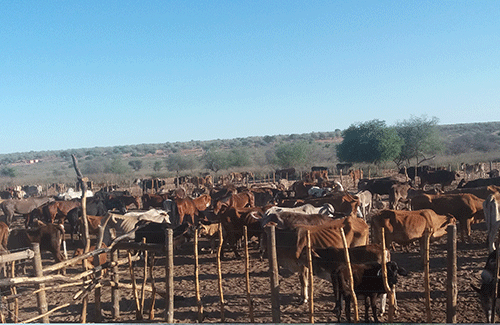OTJINENE – Farmers in the Omaheke region will be amongst those to benefit from government’s livestock support programme, which will see farmers receiving livestock marketing incentives, transport subsidies to and from grazing areas, as well as subsidies for leasing grazing areas.
The region’s farmers, who were chosen as beneficiaries of government’s drought mitigation efforts along with those from the Kunene, Omusati and parts of the Erongo regions, have been given until 31 December 2023 to make full use of this offering.
The livestock support programme will only consider claims submitted from 1 July 2023 until 31 December 2023.
New Era caught up with young farmers in the cattle-rich Otjinene constituency, who all expressed great appreciation towards government for its efforts, and how communal farmers could possibly benefit from this assistance.
Ngari Mujoro, a 37-year-old communal farmer at Otjinene’s Okehijomuramba, said the looming drought will be catastrophic for most farmers if extra precautionary measures are not taken well in advance, but admitted that moving cattle from one place to another for better grazing is always a costly exercise.
“For those of us who farm in the deeper villages, it is almost an impossible task to transport cattle from one drought-hit place to a much better one, because renting a truck for such an undertaking is costly. Even when you get people to help you move them by foot to another place, which takes days to do, you still have to give them something. In most cases, we are left with no choice but to destock. But rebuilding those numbers again after destocking is another huge problem. So, this programme will really help us, but we need more information about it and what we are required to do in order to benefit,” he added.
Another farmer, Sackeus Karuhumba, who farms mostly with goats on the outskirts of Otjinene, was not so much aware of the programme, but was optimistic that it will cushion them from the drought.
He, however, complained that many communal farmers struggle with the general recordkeeping of their activities, and that might see them not meeting some criteria to benefit from the programme.
“As a small livestock farmer, I’m mostly in the field looking after my goats. Whenever I sell some of the goats off to support my family, I’m paid in hard cash by the buyers. So, that already shows you that I might miss out on this benefit because I will not have bank statements to provide, or any records of my farming because things are very informal with us rural farmers.”
“I just hope that in future, we will be given some training on record-keeping and handling our money through banks so that we position ourselves for such benefits. But I’m pleased that government has such plans, and it’s now up to us to make full use of it, especially those who qualify,” said the 44-year-old Karuhumba.
The long-term strategy of government’s livestock support programme is to promote entrepreneurship amongst farmers, and enhance their livelihood through sustainable farming methods, while also striving to improve the performance of the livestock value chain within the mainstream supply channels, as well as to help farmers develop resilience against growing problems of climate change.
– ohembapu@nepc.com.na



